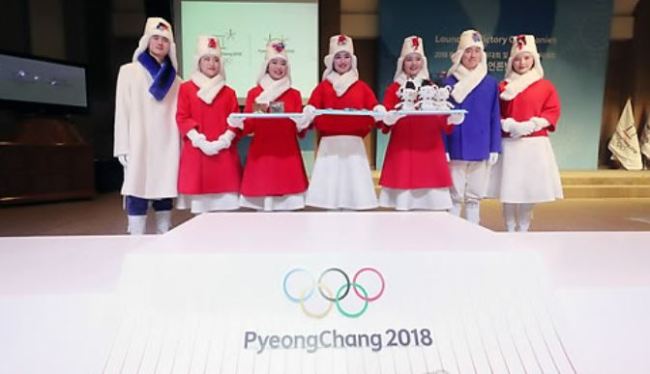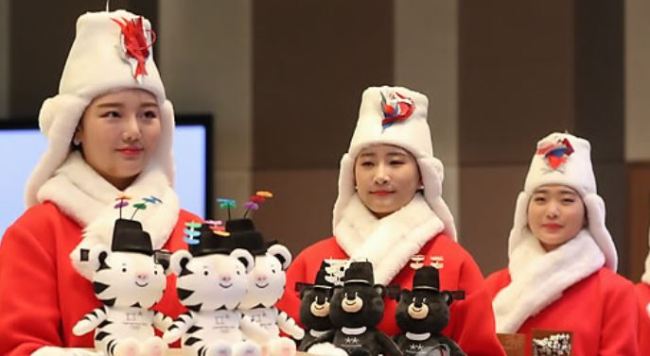South Korean organizers have unveiled the podiums, costumes, music and gifts for medalists on Wednesday that will be used during the victory ceremonies at the PyeongChang Winter Olympic and Paralympic Games next year.
The PyeongChang Organizing Committee for the 2018 Olympic & Paralympic Winter Games said the victory ceremonies will be staged under the concept of "convergence and unique."
The POCOG said designs of the victory ceremony items are based on the idea of combining aspects of Western and Eastern culture, as well as modern and traditional. The victory ceremony programs will also deliver the unique beauty of South Korean culture, the organizers said.
Top performing athletes at both the Olympic and Paralympic Winter Games will be recognized at the venue immediately after the end of competition. They will be honored again in a victory ceremony which the organizers like to call a "cultural celebration."

South Korean models wearing costumes for the victory ceremonies at the PyeongChang Winter Olympic and Paralympic Games pose for a photo behind the Olympic podium at an event in Seoul on Dec. 27, 2017. (Yonhap)
The POCOG said the Olympics will have 103 victory ceremonies, while the Paralympics will have 80 medal-awarding events. The ceremonies will be staged at the Medal Plaza inside the Olympic Plaza in PyeongChang, some 180 kilometers east of Seoul, between 7 p.m. and 9 p.m. during the Games.
The white podiums -- designed by Han Kyung-woo, a professor of installation art at Seoul National University of Science & Technology -- were inspired by snow on Korean traditional tiled roofs, also known as "giwa," and applied characteristics of "dancheong," Korean traditional decorative coloring on wooden buildings and artifacts.
The podium structure is modular in design to account for its weight and ease of mobility, according to the organizers. For the podiums for the Paralympics, there are slopes to provide easy wheelchair access.
"It took me more than six months to design the podium," Han said. "I tried my best to incorporate Korean aesthetic culture."
The elegant costume designs -- created by Geum Key-sook, a professor of textile arts and fashion design at Hongik University in Seoul -- used the colors white, blue and red, which are also used on the South Korean national flag "taegukgi." The costumes also applied designs from Korean traditional winter clothes and hats, with a snowflake pattern and the Korean alphabet incorporated. Geum also designed the costumes for medal-bearers and athlete escorts to stay warm against PyeongChang's cold weather. There are two sets of outfits made with quilting or padding – for snow and ice sports; and a design for men and women at each.

South Korean models wearing costumes for the victory ceremonies at the PyeongChang Winter Olympic and Paralympic Games hold mini dolls of the Olympic and Paralympic Games mascots that will be given to the medalists during the Winter Games at an event in Seoul on Dec. 27, 2017. (Yonhap)
"I wanted to show South Korea's identity and tried to add a modern flavor into our traditional wardrobe," Geum said. "It was important to make a wearer friendly outfit."
There will be no floral bouquets at the PyeongChang Games, but the POCOG will give a mini doll of the Games mascots wearing "Uhsahwa," a paper flower that was bestowed to those who passed national exams during the Joseon Dynasty (1392-1910), to the medal winners.
For the Olympics, the medalists will receive a mini doll of Soohorang, along with a wooden artifact with Korean traditional letters or "hangeul" and the mountainous scenery of PyeongChang. The Paralympic medalists will receive a mini doll of Bandabi with Uhsahwa.
The gifts will be presented from a special ceremony tray, which includes a non-slip surface and special grips for better stability in the cold weather, according to the POCOG.
The music that will be used during the medal-awarding ceremony was composed by Cho Young-soo, who previously made songs for K-pop groups like SG Wannabe and T-ara.
"I first thought about the feelings of the athletes on the podium," Cho said. "I used rhythm and sound of Korean traditional music gukak, but not too much so that foreign audiences can also enjoy."
Lee Hee-beom, who leads the POCOG, said the victory ceremonies will be a festival for both athletes and fans.
"We will try to show South Korea's unique culture and beauty to the world," he said. "For athletes, it's going to be one of the most important moments in their life, but for fans, it will be a culture festival." (Yonhap)







![[Graphic News] More Koreans say they plan long-distance trips this year](http://res.heraldm.com/phpwas/restmb_idxmake.php?idx=645&simg=/content/image/2024/04/17/20240417050828_0.gif&u=)